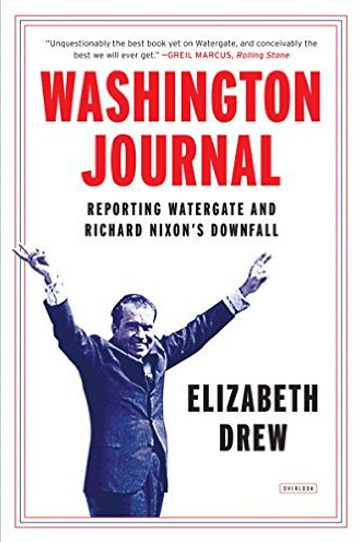
Notes on a Scandal
June 4, 2014 | The Barnes & Noble Review
In the fall of 1973, as Watergate rumbled from a tremor into an earthquake, The New Yorker assigned its new writer Elizabeth Drew to keep a journal of Washington’s tumultuous events. Toward the end of the project, which ended with Richard Nixon boarding Marine One for the last time in August 1974, an exhausted and shaken Drew reflected on what future historians would say about the scandal. She was skeptical that anyone could fully apprehend the experience of Watergate without having lived through it. “I wonder if they will really understand what it was like,” she writes. “Will they understand how degrading it was to watch a President being run to ground? Will they know how it was to feel in the thrall of this strange man, who seemed to answer only to himself? Knowing the conclusion, as they will, will they understand how difficult, frightening, and fumbling the struggle really was?”
Drew collected and published the articles in 1975 as the book Washington Journal. It subsequently fell out of print but has been republished for the fortieth anniversary of Nixon’s resignation. To read it today is to be transported into a baffling and uncertain time. The book is full of observations and sensory details that give the word “Watergate” meaning beyond the well-worn symbols of corruption and malaise — like Nixon holding up peace-sign fingers with his arms in a V. From the first page, you feel that you are in smoggy, stuffy Washington, watching things get bizarre. “It gets so hot here in the summer that the British Foreign Service used to consider this a hardship post,” Drew observes. Pages later, she writes that the “borders of fantasy keep receding as fantasy is overtaken by reality.”
The book’s early entries typify The New Yorker’s signature style of rigorous reporting coupled with ironic, understated writing. Washington Journal’s power has something to do with the way Drew’s essays go from laconic to urgent, from keeping cool enough to appear amused to being unsettled enough to betray panic. The book begins a year after the break-in at Democratic Party headquarters that kicked off the scandal. The burglars had long since pleaded guilty; the Ervin Committee was at work; and Harvard law professor Archibald Cox had been appointed Special Prosecutor. The overarching question had become the President’s own involvement, not just in the break-in but in domestic surveillance, the misuse of the CIA and the IRS to harass his political enemies, and of course the cover-up.
Shocking events followed, on a weekly and sometimes a daily basis. Vice President Spiro Agnew resigned and was replaced by Gerald Ford. The President fought in the courts, with Cox, and with Congress to avoid turning over taped conversations in the White House. When he finally relented, Nixon provided a tape with an eighteen-and-a-half-minute gap that his secretary implausibly said she erased by mistake. Later tape releases proved unequivocally that the President had lied to the public about his knowledge of the burglary. For sheer drama, nothing in the book compares to the “Saturday Night Massacre,” when Nixon fired Special Prosecutor Cox, who had vowed to keep digging for evidence after the White House ordered him to stop. Attorney General Elliot Richardson and Deputy Attorney General William Ruckelshaus both refused Nixon’s order to fire Cox, so Nixon fired them. “The news is coming too fast,” Drew writes, narrating the events with ticker-tape news bulletins. Here was a time when Washington for once was stunned into silence.
Throughout the book Drew displays an uncanny ability to write in the present tense. She observed events and then sat down afterward and described them — but such are her narrative powers that each paragraph seems to be happening as she witnessed it. She writes about the moments preceding historic votes, speeches, and developments as though she did not yet know the outcomes. Drew uses this gift to particular effect when chronicling the work of the House Judiciary Committee, which drafted and then voted to recommend the articles of impeachment to the full House of Representatives. As the clerk calls the roll, “the room is utterly still,” and those gathered within sit “stunned, drained, almost disbelieving” as the votes are cast. After the measure passed, 27-11, a group of congressmen “went into the anteroom behind the committee room and wept.”
One finishes this narrative with a sense of lessons lost. The redemption of Watergate was the passage of campaign-finance legislation, which the House approved on the very day that Nixon resigned. (One of the scandal’s forgotten chapters was the trading of cash for influence between the dairy industry and the White House.) And the Supreme Court served as the sacred, unimpeachable branch of government that called Nixon to account, unanimously ordering him to turn over tapes to the Special Prosecutor. Yet a narrow Republican majority on today’s Supreme Court has struck down campaign finance laws as unconstitutional, in 2010’s Citizens United v. FEC and this year’s McCutcheon v. FEC, thereby calling the Court’s impartiality into account. Watergate is only forty years behind us, and yet two of the structural safeguards central to its events are now gone. What happens when the next Richard Nixon takes office?